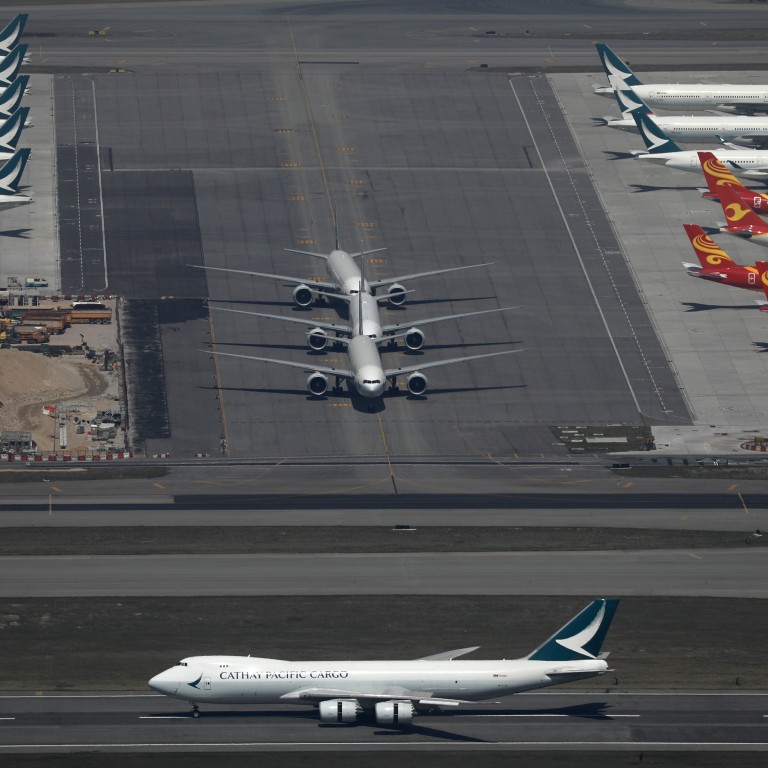
Exclusive | Hong Kong aviation authorities relax slot rules so airlines no longer have to ‘use it or lose it’, paving way for further cuts in flight schedules until October
- Civil Aviation Department extends previous measures to take in summer season
- International Air Transport Association welcomes move it says will give airlines ‘greater flexibility’ in challenging times
Hong Kong authorities have given all airlines the go ahead to cut their flight schedules until the end of October by relaxing airport slot rules, the Post has learned.
There had been calls for a global relaxation of the “use it or lose it” policy for runway slots to prevent carriers from flying empty planes between destinations to maintain the rights.
But Hong Kong government officials had previously refused to allow flexibility for airlines to cut flights beyond the end of May, after offering initial relief in light of the coronavirus epidemic and anti-government protests.
However, after the Post asked questions on Monday about the Civil Aviation Department’s (CAD) unwillingness to help, it reversed its earlier opposition and confirmed extended relief would be offered, meaning airlines will not be penalised and can keep the right to operate the airport slots in future.
“Given the latest development of Covid-19, and in line with the recommendation made by the International Air Transport Association (IATA), it has been decided that alleviation of slot usage requirement at Hong Kong International Airport will be effective for the whole of the Summer 2020 IATA Season,” a department spokeswoman said.
Airlines must use airport slots 80 per cent of the time in any given season to keep the rights to fly at specific times. These slots are considered valuable to major airlines at some of the busiest airports in the world.
Swingeing cuts to airline schedules prompted the IATA to call for an immediate suspension of airport slot rules.
The department said the move should provide “greater flexibility in aircraft deployment to meet the recent challenges faced by the aviation industry”.
A lack of further help left the likes of Cathay Pacific, one of Asia’s largest international airlines, unable to announce further flight reductions for the summer flight season, which starts in less than three weeks, and runs from March 29 until October 26.
Airlines had asked the IATA to intervene, but it was also snubbed by civil aviation authorities.
Cathay Pacific referred all comments to the regulator, while Hong Kong Airlines welcomed the additional slot waiver relief for the summer to help keep costs under control, “under this challenging operating environment”.
IATA spokesman Albert Tjoeng said his organisation had “good support” from the department on relaxing the slot usage rule up to May 31, and was told on Monday night of a full waiver until the end of October.
“We appreciate the confirmation from the Hong Kong CAD last night to alleviate the slot usage requirement for the entire season,” Tjoeng said. “This will give airlines flexibility in responding to the immediate crisis, and also plan and prepare for recovery of travel demand, hopefully in a couple of months.
“We urge other slot coordinators in the region to agree to alleviate the slot usage requirement as well.”
The IATA warned last week that in the worst case scenario the impact of the coronavirus would cost the airline industry US$113 billion in lost revenue in 2020.
But not everyone is happy with the move. Airports Council International (ACI) Asia-Pacific said it did not support a relaxation of airport slot rules.
The group also warned the region could see passenger traffic volumes fall 24 per cent in the first quarter of the year. The organisation said its airports stood to lose US$3 billion in revenue, which it blamed on the widespread cancellation of flights, in turn, collecting less in fees from airlines, plus being impacted from losses in sources of income such as retail and advertising.
“Unlike airlines, who can choose to cancel flights or relocate their aircraft to other markets to reduce operating costs, airport operators manage immovable assets that cannot be closed down. They are faced with immediate cash flow pressures with limited ability to reduce fixed costs and few resources to fund capacity expansion efforts for longer-term future growth,” said Stefano Baronci, director general of ACI Asia-Pacific.
Hong Kong International Airport saw fewer than 100 passenger flights depart per day, and has so far refused to cut aeronautical charges for airlines.

